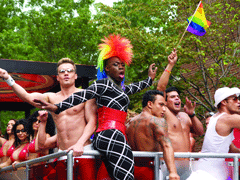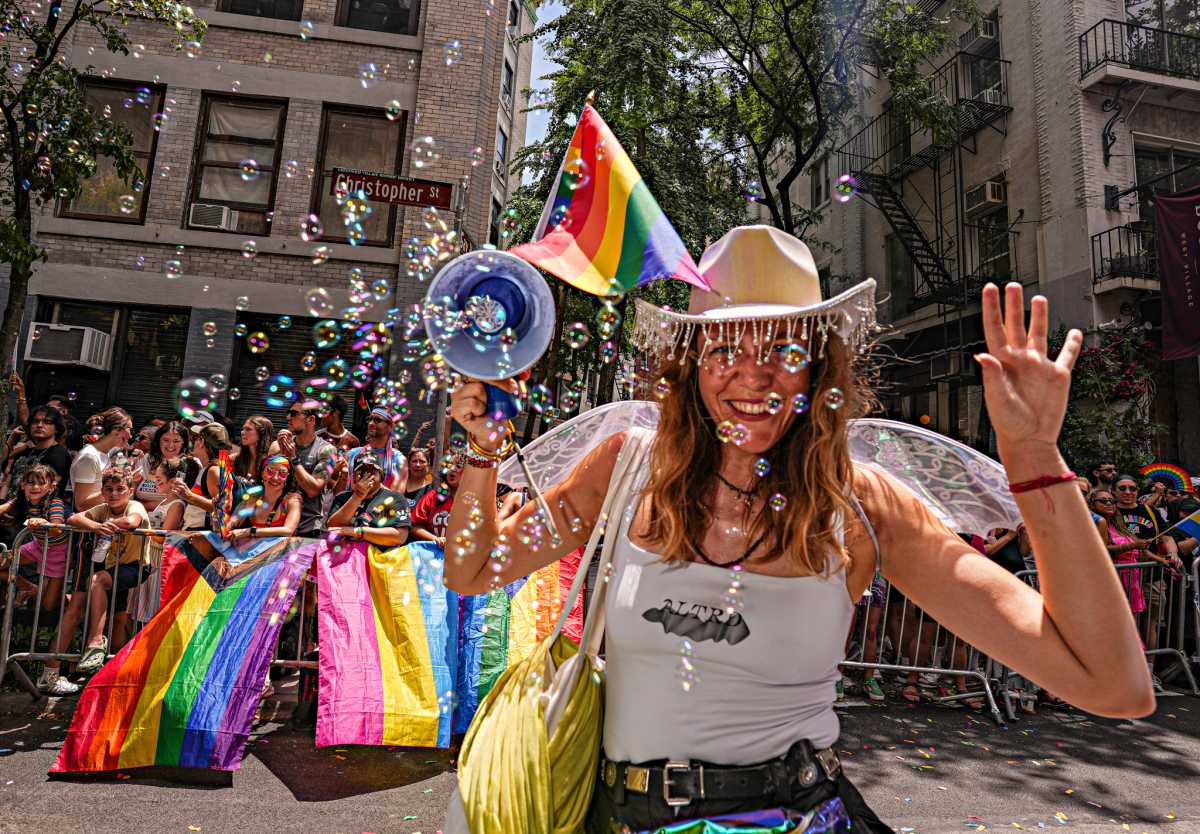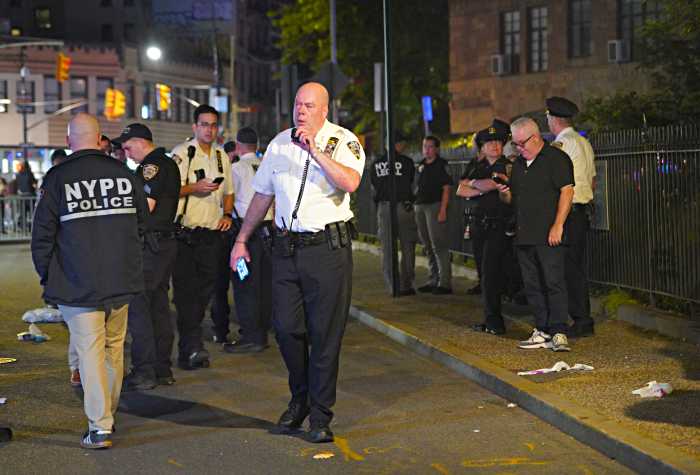Sunday’ LGBT Pride Parade, the 37th anniversary of the Stonewall Rebellion of June 1969, survived largely unscathed from threatening dark clouds and thick humid air that unleashed only one heavy downpour, a half hour before the noon step-off. Led, as is customary, by a contingent of Dykes on Bikes, the parade contained so many groups arrayed near the start at 52nd Street and Fifth Avenue that its tail end did not cross the finish line at Christopher and Hudson Streets until well past 6 p.m.
Participants spanned the diversity of the LGBT community. Marchers were as young as the infants and small children from the Community Center Kids program, that serves families headed by gay and lesbian parents—and also included many who had experienced first-hand the remarkable changes in gay life over the past half century, such as those who joined with SAGE, Services and Advocacy for Gay, Lesbian, Bisexual, and Transgender Elders.
Healthcare service and treatment groups, from Chelsea-based Gay Men’s Health Crisis, to People of Color in Crisis in Brooklyn and the Bronx Lesbian & Gay Health Resource Consortium, and many more, fielded large contingents and were given places of honor toward the front of the parade.
Luna Ortiz, who teaches photography at the East Village’s Hetrick-Martin Institute for LGBT youth, was proud that he let his face be plastered all over town in the “HIV Stops with Me” ad campaign. “It’s puts a face on HIV for youth,” he said.
Communities of faith were also well represented on Sunday. Metropolitan Community Church of New York turned out, and its pastor, Reverend Pat Bumgardner, asked what her congregation had done to advance LGBT equality over the past year, responded, “I’m proud of what our church is doing in Nigeria and Jamaica,” adding that she is headed for Malaysia in August to help “underground gay and Christian groups that are struggling.”
Congregation Beth Simchat Torah joined the march and its leader, Rabbi Sharon Kleinbaum, hopes that a portion of those marchers will join her as she journeys to Jerusalem in August to observe World Pride.
A boisterous mix of brilliantly-clad drag queens and congregants wearing identical lavender T-shirts filled a float from the Middle Collegiate Church on East Seventh Street that brought its longtime senior minister, Reverend Gordon Dragt, out of retirement, at least for the day.
Gay and lesbian police officers from GOAL, the Gay Officers Action League, marched again this year, as did LGBT firefighters riding an engine house truck down Fifth Avenue. Several dozen members of Gay Male S/M Activists sported leather chaps, vests, and caps, nipple rings, and the occasional riding crop.
Richard Burns, who for two decades has helmed the LGBT Center, said, “I’m proud that our community keeps on fighting, building community… when there is so little community in this country. Queer people continue to care about one another and strive to share a vision where we are… celebrated for who we are.”
The annual commemoration of Stonewall was originally known as the Christopher Street Liberation Day. Gay City News asked prominent LGBT leaders and non-gay elected officials marching what they were proud of accomplishing for LGBT rights in the past year—a question that caused most to hesitate lest they sound boastful, but which most managed to answer.
Congressman Anthony Weiner said he was proud of his efforts to block anti-gay Republican efforts in Washington.
“When you’re a House Democrat who favors gay marriage, you play a lot of defense and we played some pretty good defense this year,” he said.
Tom Duane, an out gay man in the state Senate Democratic minority, was proud of “beating back bad HIV bills” through rearguard action.
Alan Van Capelle, executive director of the Pride Agenda, said he was proud of building up labor and religious support for same-sex marriage generating “25,000 conversations statewide” on the issue. “That’s how we’re going to win it in New York” — whether the victory comes in the Court of Appeals or is earned the harder way in the Legislature.
Charles King, head of Housing Works, the AIDS housing group that combines activism with social services, said, “I think the thing I’m most proud of is we’re seeing a revival of the AIDS activist movement in this country. We’re not going to have an end of AIDS until we build a powerful movement again.”
Veteran activist Emmaia Gelman said she was proud that “a lot of things have happened this year that have refocused the queer community not so much on marriage but on the larger context of the community. Unfortunately, some of it has been on violence. We recently saw a couple of hundred people come out for an anti-violence march, which is more than for any other demo except against the war. It seems like people are getting back on board.”
Dirk McCall is proud that his club, Stonewall Democrats, just recruited 150 new women members. Out candidate for the Democratic nomination for attorney general, Sean Patrick Maloney, marching hand-in-hand with his partner, Randy Florke, said he is proud of raising almost two million dollars for his campaign, “more money than any gay candidate in history.”
West Side Democratic Assemblyman Daniel O’Donnell is proud that “I had the courage to be a plaintiff in the same-sex marriage case,” noting that he had political advisers who told him not to because his district is not primarily gay. He is confident he will win his case.
Assemblywoman Deborah Glick, a lesbian and a West Village Democrat, who marched and danced down Fifth Avenue with O’Donnell, cited “forcing the appropriate recognition of LGBT partners in the Family Decision Marking legislation,” that her chamber of the Legislature passed this year.
Claiming a spot right behind the towering, rainbow balloon arches and the cycling Dykes were the parade’s grand marshals—out lesbian City Council Speaker Christine Quinn and Gansevoort Market restaurateur, historic preservationist, and AIDS activist Florent Morellet—joined by New York political royalty, including Mayor Michael Bloomberg and Senator Hillary Rodham Clinton.
At 48th Street at Fifth Avenue, where he jumped into the parade, Bloomberg responded to a question about the pending gay marriage ruling from the Court of Appeals, in which his attorneys argued in opposition, by reinterating comments he made to Gay City News last December.
“If the courts rule that same sex marriages are permitted, we will start issuing marriage licenses immediately,” the mayor said. “If the courts rule that the state Constitution does not permit it, I’ve said I will go to Albany and lobby.”
Clinton, in remarks to the press at 26th Street where she joined Bloomberg and Quinn, echoed Weiner, emphasizing her willingness to stand up to Republican gay-baiting, including the recent attempt by Majority Leader Bill Frist to rally the Senate behind a constitutional amendment barring gay marriage—an effort that failed as it did in 2004 as well.
“This has been a very difficult period for the rights of all Americans, particularly given the politicization and mean-spirited approach taken by this administration and the Republican majority,” she said. “Holding the line has been a primary objective.”
Asked why, after she and her staff held several meetings with New York gay leaders about the importance of framing the amendment debate to include positive affirmations about the dignity of LGBT families, she chose not to speak on the Senate floor, Clinton talked of a careful strategy worked out with the Human Rights Campaign and said, “I had already made comment and what we wanted new faces. We wanted people from other parts of the country. We wanted Republicans as well as Democrats. And it worked and I was very glad it worked.”
Clinton’s comments in the 2004 amendment debate focused almost exclusively on it as a diversion from more pressing concerns and on the fact that marriage is threatened in the U.S. primarily by the high divorce rate.
When asked if she would support a pro-gay marriage ruling from New York’s high court, Clinton would not go as far as the Republican mayor.
“Let’s see what happens,” was all she would say. Her colleague, Chuck Schumer, marching separately, signaled a slightly more positive tone, saying, “I’d have to read it first. I’ve always said I’d be for whatever each state wants.”
Asked why he did not speak during the amendment debate this year, Schumer, who in his 2004 floor speech talked about gun control, said, “I was at my daughter’s graduation. I flew back to vote.”
“If we get back the Senate,” said Schumer, chair of the Democratic Senate Campaign Committee, “we can start doing good things and at the top of the list is an anti-discrimination bill that is long overdue.” Clinton said that the “more positive agenda” of hate crimes legislation and job bias would move if the Democrats prevail in November.
Morellet said he was most proud of “people coming up to me that I’ve never met and saying, ‘You don’t know me, but ten years ago when I saw your t-cells on your menu board it helped me because I used to freak out and never told anybody [about having HIV]. You helped me crack the nut and start blossoming.’”
gaycitynews.com


































